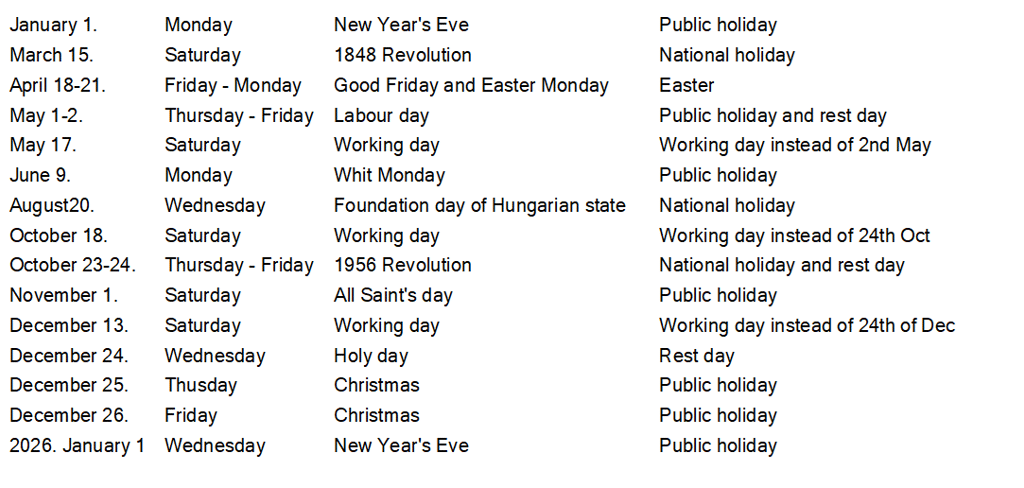
2025 work schedule and public holidays in Hungary why is vacation planning important?
2025 work schedule and public holidays in Hungary why is vacation planning important: How can you as an HR professional or as an Employee support the vacation planning process? Find the answers in our article!
1/13/20255 min read
The start of a new year always brings great news: we have vacation days again! :) The beginning of the year is the perfect time to reflect on annual plans, including work schedules and vacations for the year ahead. For HR professionals, it’s especially important to keep employees informed about changes to the work calendar, such as shifted workdays, Saturday work shifts, and public holidays, so they can start planning their time off early.
This is usually the part where most employees groan—why do we need to think about this already? Of course, the question pops up: "How am I supposed to know what I’ll be doing for the rest of the year?" It’s no surprise that HR may not be the most popular department during this time. Why is vacation planning so important in Hungary, and how can you as an HR professional support the vacation planning process? You’ll find the answers in our article.
2025 work schedule, public holidays in Hungary:
Why is vacation planning important?
Public holidays, working day transfers and long weekends in 2025
Decree No. 11/2024. (IV. 8.) of the National Ministry of Labour can be found here:


As an employee, planning your vacation early increases your chances of taking time off when you want, rather than when your employer decides or when others aren’t off. Especially in smaller teams, it’s usually the fastest planner who wins! :) For the "I don’t know yet what I’ll be doing" type of spontaneous colleagues, all that’s left is whatever slots remain. Of course, there’s a certain charm to this too, and some people prefer it. And yes, we know HR is often seen as the spontaneity killer! :)
Why does HR bother you with this? Early planning helps employers manage resources more effectively, ensuring smooth business operations, successful project completion, and avoiding understaffing. It also helps managers monitor summer and Christmas vacation schedules to prevent the team or operations from grinding to a halt. Naturally, this varies by industry and type of work—there’s a big difference between office-based work and production line manufacturing. Business specific factors must always be taken into account.
Vacation planning: why is timing important?
1.Planning
2.Avoid accumulation of vacation days
We all know the "vacation hoarders"—those who do everything they can to stash a few extra days, carry them over, and then wonder why it’s not allowed. But let’s break it down—why can’t the most of the employers support this? When HR or your manager starts pushing you to plan your vacation, it’s worth considering their perspective too. First of all, HR professionals are employees just like you, even if they don’t always seem like it :). Second, they’re not doing this to annoy you, they have a reason. As an employee, you need to understand that labor laws aren’t particularly flexible on this matter. Accumulating unused vacation days can lead to resource issues for the company, or worse, trigger problems during a labor inspection.
Let’s face it from financial perspective—you probably never think about this as an employee. But when companies have to pay out large amounts of unused vacation days to employees who leave, it’s essentially throwing money out the window. With proper planning, these costs are entirely avoidable and could instead be used for something beneficial—like a salary raise for you. :). So, when you’re tempted to carry over a few days, let it go and take that time off instead. The law allows very limited options for carrying over unused days, mostly for supplemental leave, and even then, it requires an agreement. For employers, this creates unnecessary administrative burdens and contributes to the very accumulation they’re trying to avoid.
Vacation days are there to help you rest and recharge. If you don’t take them, sooner or later, you’ll get tired. You’ll struggle to relax, your immune system will weaken, and you might even get sick—or worse, completely burn out. Do you really want that? Didn’t think so.
3.Using the most of long weekends
Public holidays and long weekends are perfect opportunities for planning extended breaks and making the most of your vacation days. If you have only 20 days of leave because you’re still “shamelessly young”, take advantage of these long weekends whenever you can!
As an HR professional, here are some steps you can take to ensure vacation planning runs smoothly:
Prepare an annual information guide: Distribute a detailed guide about public holidays, shifted workdays, and vacation policies. Keep in mind that not everyone is familiar with these rules—many are just starting their careers or simply don’t know what they can or can't do. It’s not their job to be experts, but it’s your role to make the rules clear.
Set deadlines: Establish a deadline for planning vacation days for the year ahead. Yes, you’ll be the “bad guy” for a while, but it’s important that employees understand plans aren’t set in stone—they can be adjusted if needed, however, having a plan is crucial. Employers, HR, and managers all dislike a lack of planning. With a solid plan, everyone is happy. HR can relax, managers are satisfied, and employees can look forward to their vacations. Win-win!
Schedule vacation usage: Encourage employers to ensure employees use their vacation proportionally throughout the year. For instance, set a guideline that a certain percentage of leave should be taken by the end of summer, leaving enough days for Christmas or autumn without disrupting business operations.
Follow-up: As HR, it’s your and the managers' responsibility to track vacation usage. Ensure employees are planning and using their vacation time, so the company can take action if necessary. Nobody enjoys enforcing these actions, but sometimes it’s unavoidable. Be proactive—if you don’t take the lead, nobody will either. Collaborate with managers, and leverage an HR system for easier tracking. If no system is in place, create or request reports from payroll systems and share insights with managers.
Educate: Employees and even managers are often unaware of vacation-related rules. Many managers don’t dedicate enough attention to the vacation planning, which can lead to problems when employees have too many unused days at the end of the year and are still needed at work. Paying out unused leave upon an employee’s exit is an unexpected cost for the company, but it could’ve been avoided with proper planning. Show managers the financial impact—prepare a report showing how much has been spent on unused vacation payouts. Quantifying these costs can be an eye-opener for management and foster greater engagement in proactive vacation planning processes. By demonstrating the tangible benefits of careful planning, you can help align leadership priorities with long-term organizational goals. Trust me, they’ll care more after seeing the numbers!
Dealing with Saturday workdays: When shifted workdays create unappealing Saturday work requirements, employers should consider alternative options. This could mean designating such Saturdays as mandatory leave days or allowing employees to choose if they would like to work or take time off. From the employer's point of view, who is going to give 100% effort on that Saturday? Everybody, put your hand on your heart! :) With respect to the exception, it's like pulling teeth, isn't it? That's often why employers order compulsory holidays.
Encourage Rest: Everyone needs rest! There’s always that one employee who refuses to take a vacation unless forced, or someone who believes they’re indispensable. While timing might occasionally be less than ideal, in 99% of cases, life goes on without you for a week or two. Vacation time is essential, and everyone deserves at least two uninterrupted weeks of rest. If you come back and have forgotten all your passwords, congratulations—you’ve truly recharged!
If you’re in HR, it’s time to rethink your vacation planning process—it’s best to get started by February. And if you’re an employee, now that you know all the ins and outs, go ahead and plan your vacation days! Even if the trip ends up being spontaneous, you understand, don't you :)
How can HR support the vacation planning process?
STAY UPDATED, FOLLOW US HERE!
Don't miss out on our latest news and articles!
Services:
© All rights reserved.
Contact:
HR Guideways - the road to real HR
Pictures and icons by Freepik
Company details:
1618 Terv Számviteli és Tanácsadó Bt.
tax number: 22183859-2-41
registration number: 01-06-769999
location: Hungary, Budapest
